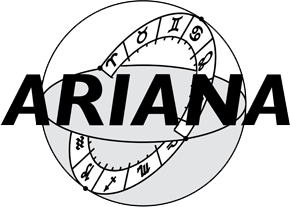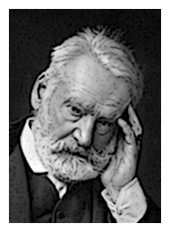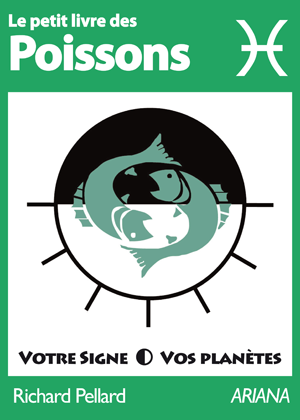Your Planets
Portraits of the Planets
Aspects between Planets
The planetary ages
The planetary families
Planets in Signs
The Planets in comics


What is happening in the skies of the northern hemisphere between 19th February and 21st March? The nights are always longer than the days, but the latter grow in length; the nocturnal world resists and the diurnal one progresses and, day after day, their durations tend towards equality, an equality which will be effective on 21st March, during the spring equinox.
.png)
.png)
.png)

Under the Sign of Pisces, dominant in Victor Hugo’s Chart, this pair of opposites that are the diurnal universe and the nocturnal universe confront each other by getting closer. We find ourselves at the end of a cycle and we anticipate the arrival of a new one. One world is fading, another is looming. They are antagonistic and yet united, one existing only in opposition to the other. To describe this phenomenon, which also occurs for the sign of Virgo, modern astrology speaks of the union and clash of opposites, a formula which alone could suffice, if it were possible, to sum up life and the work of Victor Hugo.
“The essential feature of Hugo’s religion is a cosmic twist, wrote André Maurois, who was certainly unaware that he was thus evoking the prelude to the spring equinox. Suddenly what was damned will be saved, what was humbled will be exalted, hence his optimism. He knows that the usurper will be defeated, that good will triumph, that God will win.”
Before going further, let’s dispel a very widespread prejudice among astrologers, prejudice according to which the Pisces would be a sign “mystical”. It is not so: you can very well be very Pisces and materialistic or atheist. It is also the most common type of Pisces in the materialistic and atheistic West. Let’s not mix everything up and give back to Caesar what is Caesar’s, and to God what is God’s: mysticism and religion are not in heaven, but in the heart of man, or more exactly in the recesses depths of his soul.
Pisces or not, not all souls openly yearn for infinity. That of Hugo, yes. His spirit was not religious because he was Pisces, but he lived his religiosity in a very Pisces mode. To understand this is to understand the very foundations of serious astrology.
Now back to the meaning and the “clash of opposites” that characterize beings strongly marked by Pisces. This shock, Victor Hugo therefore lived it in a mystical mode of which the following text is a magnificent illustration:
“Affirmation begets negation; the yes produces the no. The first of the affirmations is God; the first of the negations is Satan. The destiny of all affirmation is to constantly struggle with the negation which is proper to it. The day is an affirmation of which the night is the negation. Genius is an affirmation of which envy is the negation. Hierarchy is an affirmation of which equality is the negation. Religion, power, art, poetry are affirmations whose irony, under the various names of reason, criticism and opposition, is the negation. The sultan is the affirmation, the eunuch is the negation. In the order of historical facts as in the order of philosophical facts there are men who affirm entirely as there are men who deny. Affirmation is above, negation is below. The destiny of any negation is to be itself always and stubbornly denied by another negation which is lower than it and less than it. The tiger eats the man, the louse eats the tiger. Accept these laws; let’s not judge them. After all, antagonism brings out being. Everything that is done is so done. God and Satan are the very basis of religions; day and night is the very law of creation; the yes and the no is the very dialogue of humanity.”
Thus Victor Hugo lived all his life crucified between united opposites, which explains many of his contradictions very well described by one of his biographers, Henri Guillemin: “Passionate and calculating, frenetic and poised, reckless with caution, he is a complicated devourer of a sober. Sagacious common sense is not his least quality. And what he calls, at certain times, prejudices, foolishness, nonsense, these things which bother him, which he would like to trample on, receive from a part of himself a deep assent.”
But the Sign of Pisces alone is not enough to explain Hugo’s extreme awareness of opposites. The dominant planets are of course also part of the game. “I am a force that goes”: this is how he described himself in his famous play Hernani. This is the very definition of concrete reality: existence is movement. This is also the definition of Mars in modern astrology, the function of which is to make existence exist in a permanent duo-duel with the outside world: duo because it is necessary to deal with it in order to draw from it the forces necessary for action, duel because it you have to fight against it to survive.
As a teenager, Victor Hugo wanted to be “Chateaubriand or nothing”, which gives the measure of its ambitions jupiterian, his thirst for glory and recognition. As if by chance, François-René de Chateaubriand was also Saturno-jupiterian (Saturn in the Ascendant to the square of Jupiter) and strongly marked by the Virgo, the other Sign in “clash of opposites”. And like Victor Hugo, he was steeped in contradictions, as thirsty for glory as he was meditative and introspective.
The political itineraries of the two men are strikingly similar: Chateaubriand rallied to Napoleon then became his bitter enemy, actively contributed to the Restoration of Louis XVIII then attacked him violently, favored the fall of Charles X to then manifest his loyalty to the royal family in exile after 1830. For his part, after having been a Catholic and an ultra-royalist, Hugo became a Bonapartist and a liberal, to end up a republican and a socialist.
Opportunism, inconsistency? Not necessarily. Rather, clashes of opposites: if these reversals allowed the two men to continue brilliant careers under all regimes, they were also resolute opponents of any conservative stagnation, be it “of right” or “from the left”. Both were in tune with a progress that they considered inevitable: “Force is to move forward with human intelligence. Respect the majesty of time. I found myself between two centuries as if at the confluence of two rivers; I dived into their troubled waters, moving away with regret from the old shore where I was born, swimming with hope towards an unknown shore”, wrote Chateaubriand.
Echoing this, Hugo replied that “The future advances, the past resists: the struggle is violent, the efforts sometimes excessive; let’s moderate them. The certainty of triumph is measured by the dignity of the fight; victory is all the more certain the more tranquil it is.”
“I leave, and you stay”, said Chateaubriand shortly before his death, when the genius of Victor Hugo emerged in a dazzling way.
And justly, Mars is dominant, Aquarius and at Imum Coeli in the Poet’s Chart, in which the marsian duets fueled the clash of opposites, gave it a carnal, palpable, material dimension. “He was not content to be a thinker: he was a fighter”, wrote a journalist of the Petit Parisien the day after Victor Hugo’s death. “He did not want to be only the head that meditates: he was also the arm that acts.” Moreover, the last words he wrote before dying are these: “To love is to act.”
Hugo’s love for women and for humanity was far from being cutesy, ethereal, abstract: it was a violent and passionate feeling, a marsian feeling that urged him to take situations of injustice head on. body, to engage physically in all the fights that he considered legitimate, to take on realities head-on in order to transform them. For a Mars in Aquarius at the trine of Uranus, the struggle carries within it the seeds of hope (Aquarius) and it is imperative to boldly and clearly indicate the paths (Uranus): direct action is recreation, springboard for renewal, midwife of future possibilities, concrete affirmation of an intransigent liberating will.
Hugo the Marsian had no indulgence for evanescent and evaporated poetry: “poets, he wrote, it is not enough to rise; you still have to know what you are doing up there, what you want and where you are going. There are spirits which rise without visible wings, that is to say without real genius, only because there is something subtle in them which puffs them up and makes them light. Cut this thread which attaches them to the earth and which is called common sense, here they go, they go up, they go up so high that they get lost.”
For Hugo, love and poetry were above all action.
Second dominant configuration of Victor Hugo’s sky: conjunction Jupiter-Saturn in higher culmination. It combines ambition, the thirst for social success, pride, even careerism and opportunism (Jupiter-Leo) and modesty, the quest for deep values, humility, prudence and doubt (Saturn-Virgo). Another clash of opposites: by Jupiter he had to devour honours, become by his works a famous, exemplary and recognized character, while by Saturn he was a sober austere, solitary and meditative spirit.
Under a conjunction Jupiter-Saturn, joviality is never far from melancholy, sadness from joyous euphoria, the feeling of victory from the feeling of failure. Thus Hugo, while enjoying his triumphs, did not remain at the same time skeptical, disillusioned, so much did he measure their vanity, caught up in the clash of opposites between the jupiterian extraversion which gets drunk on language and certainties and the saturnian introversion that cherishes silence and doubt.
Jupiter and Saturn are opposite Sun-Venus-Pluto: another clash of opposites, this time between static and conservative order (Sun-Jupiter) and dynamic and creative disorder (Saturn-Pluto). Jupitero-solar and therefore a man of order, a wealthy bourgeois to boot, Hugo could not stand anarchy and disorder. During the revolutionary riots of 1848, he who sympathized with the misery of the people and sought to pass laws to eradicate it, found himself on the side of repression by rejecting the “shit” popular. Disarmed but resolute, he stormed the revolutionary barricades at the head of the forces of order, shouting to them: “We must end the children! This war of skirmishers is deadly! Fewer people are lost by marching bravely into danger.”
It must be said that on 24th June 1848, Mars in Leo transited against his native position. He will almost be killed. One of the officers who accompanied him confided in a letter that “Led by such a man, we arrived at the barricades which were successively removed…” It was really “Hugo vs Les Miserables”. A height! Inconsistency? No, a new clash of opposites that he would formulate as follows: “The exasperation of the suffering and bleeding crowd, its misguided violence on principles, its assaults on the law, are popular coups d’etat and must be repressed. The honest man devotes himself to it, and out of love for this crowd, he fights it.”
But a year later, a new turnaround: seeing that the government did nothing against the misery at the origin of these riots, the prestigious Academician, the Peer of France praised by the power in place, delivered his famous Discourse on misery (“Don’t want progress? You will have revolutions!”) and goes with arms and baggage in the Republican opposition. This time it’s the saturno-plutonian sensitive to the fate of the excluded, the ungraded, the flouted who express themselves. Inconsistency? Not yet. Hugo always seeks to combine opposites that collide. Too much disorder calls for order in response. And too much conservative order calls for creative disorder. Revolted, under the square of Uranus-Pluto to his native Mars, he turns into an implacable vigilante, into “wild drunk and rebellious” in his own words, which will lead him to live two years later long years of exile in the Channel Islands of Jersey and Guernsey.
For modern astrology, one of the other major characteristics of the sign of Pisces is extinctive inhibition, that is to say the ability to eliminate, boycott, proscribe or ignore everything that is not the absolute to which one devotes oneself.
Victor Hugo’s absolute was freedom within the law. And on that, he behaved well in Pisces strongly marked by Mars, Jupiter and Saturn, the planets of realism, common sense and constructive will: all his life, he remained steadfast in his refusals, impervious to discouragement, stoic in the face of the multiple blows of fate that struck him throughout his tumultuous existence.
To be Pisces like him is to have a consummate art to escape others and too simple definitions, it is to oppose a “no” monolithic and systematic to everything that tries to enclose the ample movement of life in shackles: “No, no revolt against insult, no expenditure of emotion, no reprisals, have severe tranquility, he wrote from his exile. The rock trickles, but does not move. Sometimes it shines from the runoff. Slander ends up being a luster. By a silver ribbon on the rose, you can tell that the caterpillar has passed.” Victor Hugo was a rock.
Last ruling planet in the Chart of the creator of the Miserables: Venus. Conjunct Pluto and the Sun, opposed to Jupiter and Saturn, she made him a being of powerful and disorderly sensuality, a great seducer with multiple loves displayed at the same time (Sun) and secret (Pluto). He, who at the beginning of his life was an exemplary paragon of Catholic virtue, did not hesitate to give in to the temptation of adultery. Less than ten years after his marriage to the virtuous Adèle, he fell in love with Juliette Drouet, a courtesan of sulphurous reputation who was the great love of his life… in the midst of a multitude of other female conquests.
It must be said that with such a dissonant Venus in Pisces, his love life was, like his life as a writer and politician, entirely under the influence of the shock of opposites: aspiration for wisdom and the respectability of on one side (Sun-Jupiter-Saturn), and on the other the desire for transgression, an attraction for sentimental adventure and the sensual abysses it is likely to harbor (Venus-Pluto).
Victor Hugo is a very great unknown painter, no doubt because his imposing literary production cast a shadow (another effect of the clash of opposites) on his pictorial works. Placed under the sign of a Sun-Pluto-Venus conjunction in Pisces, his paintings are those of an aesthete in love with colors (Venus) expert in the art of contrasts between light (Sun) and the dark (Pluto).
Mercury is one of the weakest planets in Victor Hugo’s Chart. When it is dominant, it incites and inclines to take things lightly, to distract oneself, to laugh at solemnities, to disperse, not to take words seriously. None of this with the author of Miserables: all his life and his work show how passionate he was in each of his positions, haunted by work (“Not a day without a line”, he said), sensitive to honors, focused on the tasks at hand and imbued with seriousness.
He was also known to hate puns and puns (which Mercurians generally love), which he considered to be just the “droppings of the flying spirit”. A very anti-mercurian way of saying that we have no right to play with language. This great champion and actor of freedom found his limits there: in his place, a Mercurian would have gladly admitted that he “there is no freedom without toast”.
Text published in Astrologos No. 9, February 2002.

Le petit livre des Poissons
par
49 pages. Illustrations en couleur.
Ce livre présente et explique les trois zodiaques : celui du décor des constellations, celui de l’astrologie traditionnelle basé sur les Quatre Éléments symboliques (Feu, Terre, Air & Eau) et celui de l’astrologie naturelle basé sur les phénomènes astronomiques objectifs.
Interprétation des Poissons selon la symbolique classique et selon ses réflexes dans le zodiaque naturel (force, vitesse, équilibre) ; interprétation des Poissons en fonction des planètes dominantes ; le Signe solaire & le Signe Ascendant.
Téléchargez-le dès maintenant dans notre boutique